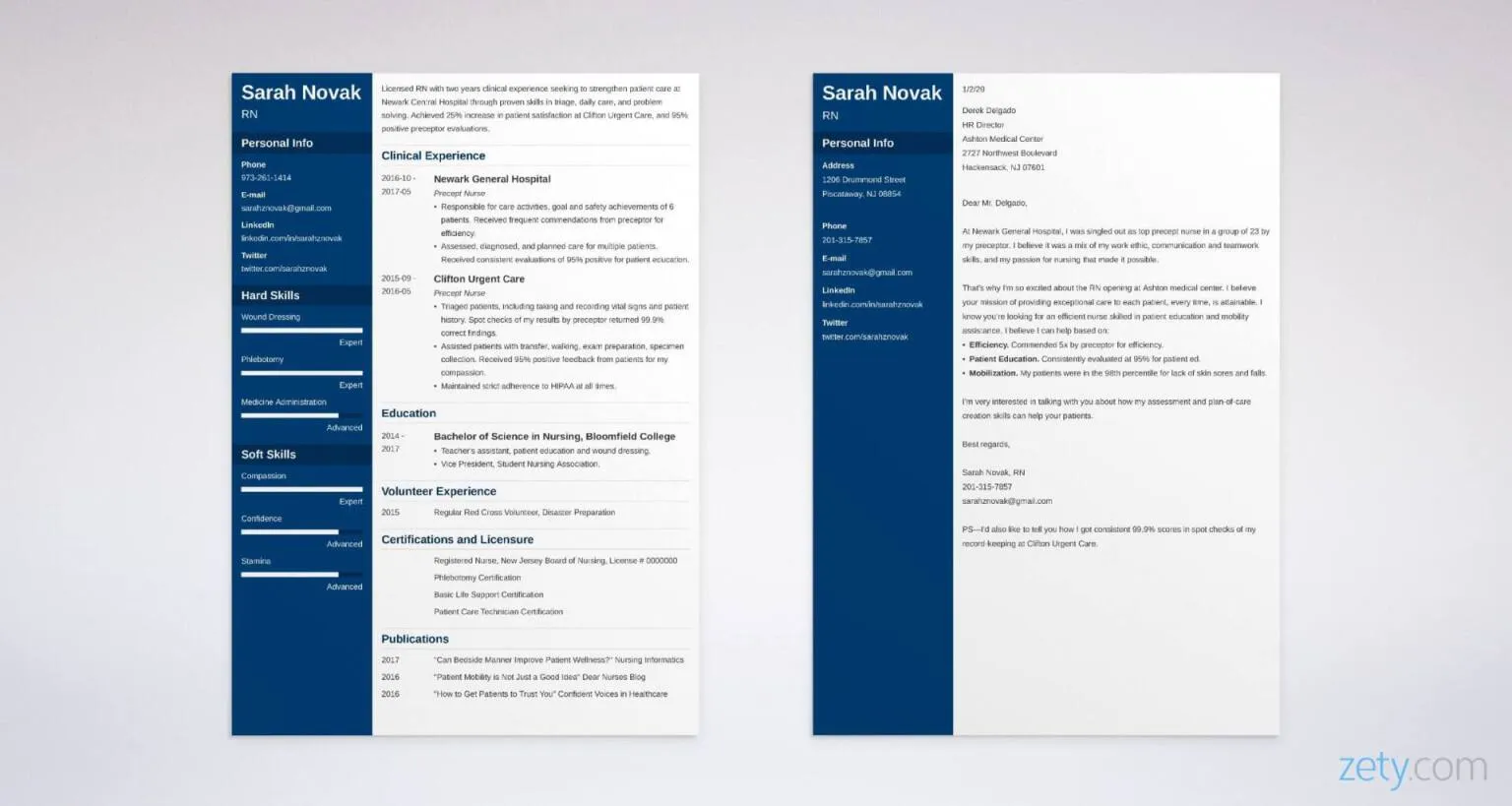What is a Nursing Internship Cover Letter
A nursing internship cover letter is a crucial document that accompanies your resume when applying for a nursing internship. It serves as your first introduction to potential employers, providing an opportunity to showcase your personality, skills, and passion for nursing. Unlike a resume, which lists your experiences and qualifications, a cover letter allows you to elaborate on your motivations, connect your skills to the internship requirements, and demonstrate your enthusiasm for the specific opportunity. It’s your chance to make a strong first impression and persuade the hiring manager that you are the ideal candidate for the position. A well-crafted cover letter can significantly increase your chances of securing an interview and ultimately, the internship.
Why is a Cover Letter Important
In the competitive field of nursing, a cover letter is more than just a formality; it’s a strategic tool. It offers you the space to tell your story, highlighting why you chose nursing and what makes you unique. It allows you to explain any gaps in your experience, address specific requirements of the internship, and show your understanding of the healthcare organization. The cover letter proves that you’ve taken the time to research the opportunity and tailor your application, demonstrating genuine interest. It’s also an opportunity to convey your personality and communication skills, essential traits in nursing. A strong cover letter can differentiate you from other applicants who might have similar qualifications on paper, making you a more memorable and appealing candidate for a nursing internship, and helping you to secure your first step in the nursing world.
Formatting Your Nursing Internship Cover Letter
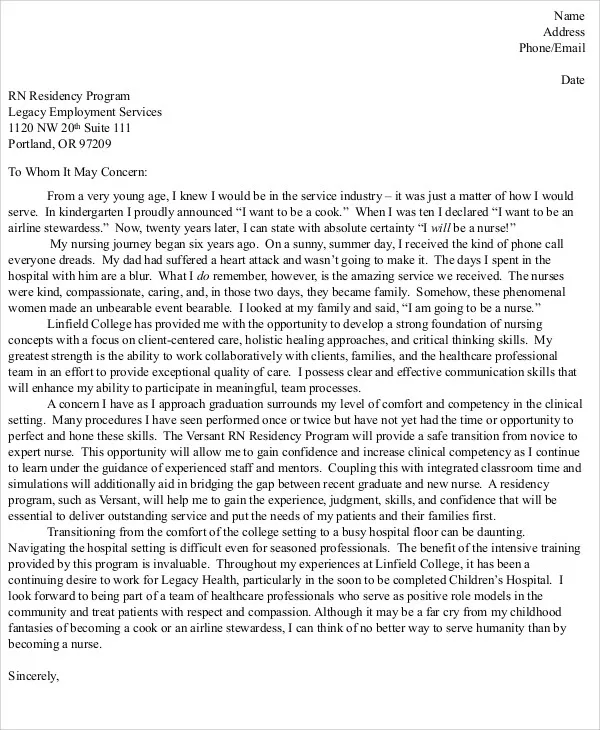
Proper formatting is critical for a professional cover letter. It ensures readability and demonstrates your attention to detail, which are highly valued in nursing. The format should be clean, well-organized, and easy to navigate. Aim for a standard business letter format. Use a professional font like Times New Roman, Arial, or Calibri, and keep the font size between 10 and 12 points. Maintain single-spacing within paragraphs and double-spacing between paragraphs. The letter should be no more than one page long, focusing on key information. Your cover letter is a reflection of you, so it is important to make sure your cover letter is well structured, organized, and free of any errors.
Header Essentials
The header of your nursing internship cover letter should include your contact information and the date. This ensures that the recipient can easily reach you and that the letter is properly dated. Be sure to include your full name, address, phone number, and email address at the top left corner of the page. Make sure your email address is professional. After your contact information, skip a line and add the date. Make sure that the date is the day you’re submitting your letter. Always use a professional font and style to keep your cover letter looking neat and easy to read. Be mindful of the formatting to ensure that the appearance is professional and reflects your attention to detail.
Contact Information
Your contact information should be clear and easy to find. Include your full name, mailing address, phone number, and a professional email address. Ensure your email address sounds professional; avoid using nicknames or informal language. Check that your phone number is correct, as this is how the employer may contact you for an interview. Double-check all information to avoid any errors that could hinder the employer from contacting you. Accuracy in your contact information is paramount; it’s the gateway for the employer to reach you and marks the initial step of your professional presentation.
Date
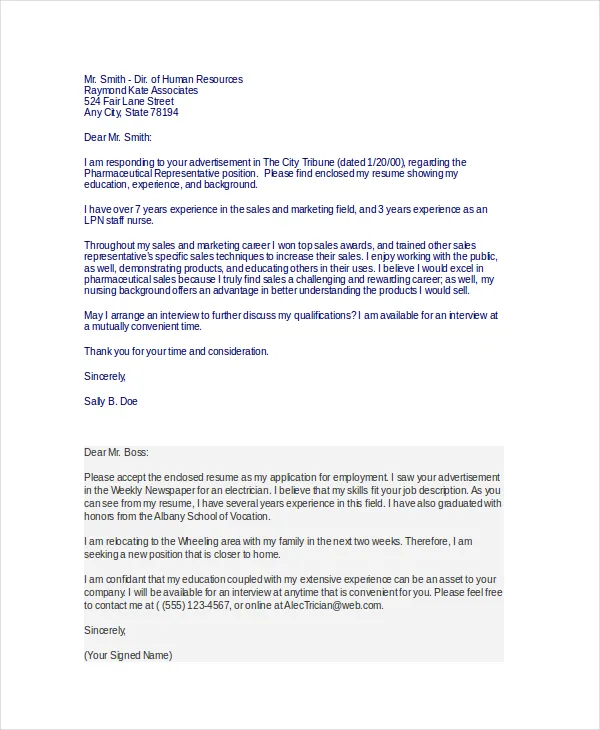
The date on your cover letter signifies when you are submitting your application. Place the current date directly below your contact information and before the recipient’s details. Formatting should follow a standard, professional format. Using the correct date demonstrates timeliness and attention to detail, essential qualities in a nursing professional. Ensuring the date is accurate not only adds to the professionalism of your letter but also indicates you are up-to-date with the application process. A properly dated cover letter reflects your organizational skills and respect for the application procedure.
Recipient Details
Always address your cover letter to a specific person. Research the organization to find the hiring manager’s name or the name of the person responsible for the internship program. This shows that you have taken the time to learn about the role and the organization, and it also makes your letter more personal and engaging. Use their full name and title, and ensure that you spell their name correctly. If you are unable to find a specific name, using the title of the hiring manager, such as “Hiring Manager,” is acceptable, but personalized letters always make a better impression. Finding out the name of the recipient demonstrates your initiative.
Crafting a Compelling Opening
The opening paragraph is your first chance to capture the reader’s attention. It sets the tone for the rest of your cover letter and encourages the reader to continue. Make your opening compelling and memorable. Avoid generic phrases. Immediately state the position you’re applying for and how you learned about the opportunity. Mentioning the specific internship and where you found it shows genuine interest. Tailor your opening to the specific requirements of the internship and highlight a key skill or experience that aligns with the position. This demonstrates your understanding of the role and your eagerness to contribute.
Grab Attention
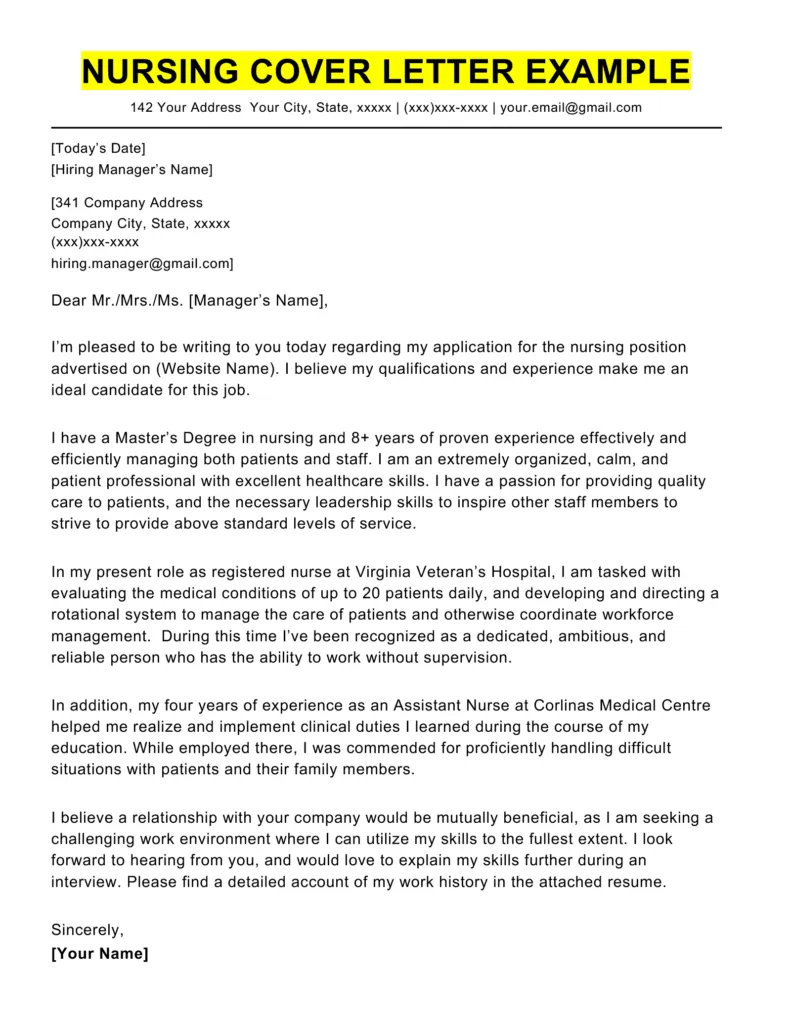
Start your cover letter with a hook. Avoid generic opening lines like “I am writing to apply…”. Instead, try a sentence that immediately grabs the reader’s attention. For example, you could mention a specific skill or experience that aligns with the internship, or you could express your enthusiasm for the organization’s mission. Use an anecdote or a statement that highlights your key qualifications. Your goal is to make the reader want to learn more about you. A strong opening makes a lasting impression. Starting strong shows that you’re confident and professional and are the ideal candidate for the position.
State Your Purpose
After you’ve grabbed their attention, state the purpose of your letter. Clearly and concisely state that you are applying for the nursing internship position. Mention where you saw the job posting—this could be a specific website, a career fair, or a referral from a contact. Showing how you learned about the opportunity demonstrates your initiative. This helps the reader quickly understand why you are writing. Ensure the title of the position is correct, and the reader immediately knows your purpose. Be clear about the role you are applying for. It’s your first opportunity to introduce yourself.
Highlighting Your Qualifications
In the body of your cover letter, highlight your qualifications by demonstrating how your skills and experiences align with the internship requirements. Refer to the job description and focus on the skills and experiences they are looking for. Use specific examples from your coursework, clinical rotations, or previous roles to illustrate your abilities. Quantify your achievements whenever possible. This section should be customized to match the specific requirements. This proves you possess the right attributes to excel in the internship. Use action verbs to start sentences to convey confidence and professionalism.
Emphasize Relevant Skills
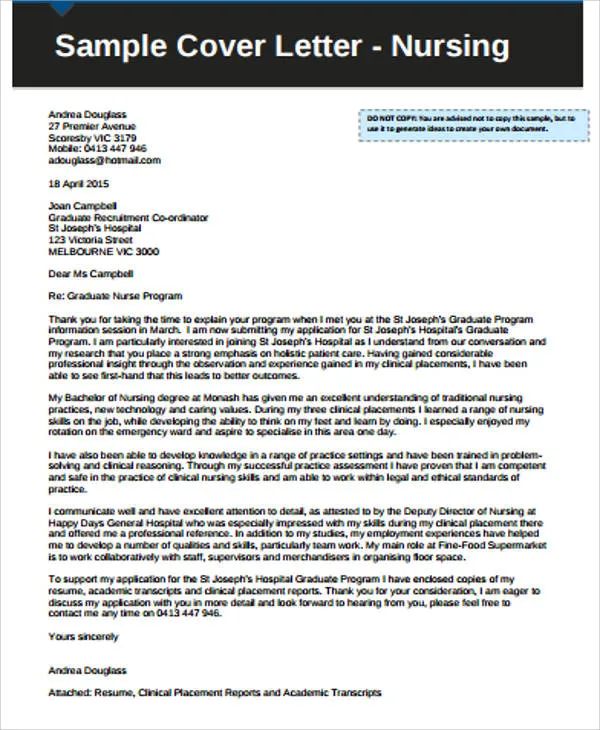
Focus on the skills that are most relevant to the nursing internship. Review the job description to identify the key skills they are seeking. These could include clinical skills such as patient assessment, medication administration, and wound care. Highlight your interpersonal skills, such as communication, empathy, and teamwork. Provide examples of how you have used these skills in previous settings, such as clinical rotations, volunteer work, or other experiences. Use action verbs to describe your skills. Demonstrate to the employer that you already possess the skills necessary to succeed in a nursing internship, such as organizational skills and the ability to adapt to different situations.
Showcase Experience
Showcase your relevant experience by providing specific examples of your past roles. If you have prior experience in healthcare, such as a CNA or volunteer role, describe your responsibilities and what you learned. Even if your experience is outside of healthcare, highlight transferable skills like teamwork, problem-solving, or communication. Use the STAR method (Situation, Task, Action, Result) to structure your examples. Briefly describe the situation, your task, the actions you took, and the results you achieved. This will help you to paint a clear picture of your skills. Include all internships to show a record of practical skills to show your dedication.
Quantify Your Achievements
Quantifying your achievements makes your cover letter more impactful. Use numbers and data to demonstrate your accomplishments. Instead of saying “Improved patient satisfaction,” say, “Increased patient satisfaction scores by 15% through implementing a new communication strategy.” If you have experience with any specific medical equipment or software, mention that and how you used it. When possible, use metrics to quantify your accomplishments. Include numbers to highlight your achievements to make your application more compelling. Quantifying your achievements will make your cover letter more memorable and reinforce your skills and abilities. It will show potential employers that you are a capable candidate.
Demonstrating Your Passion
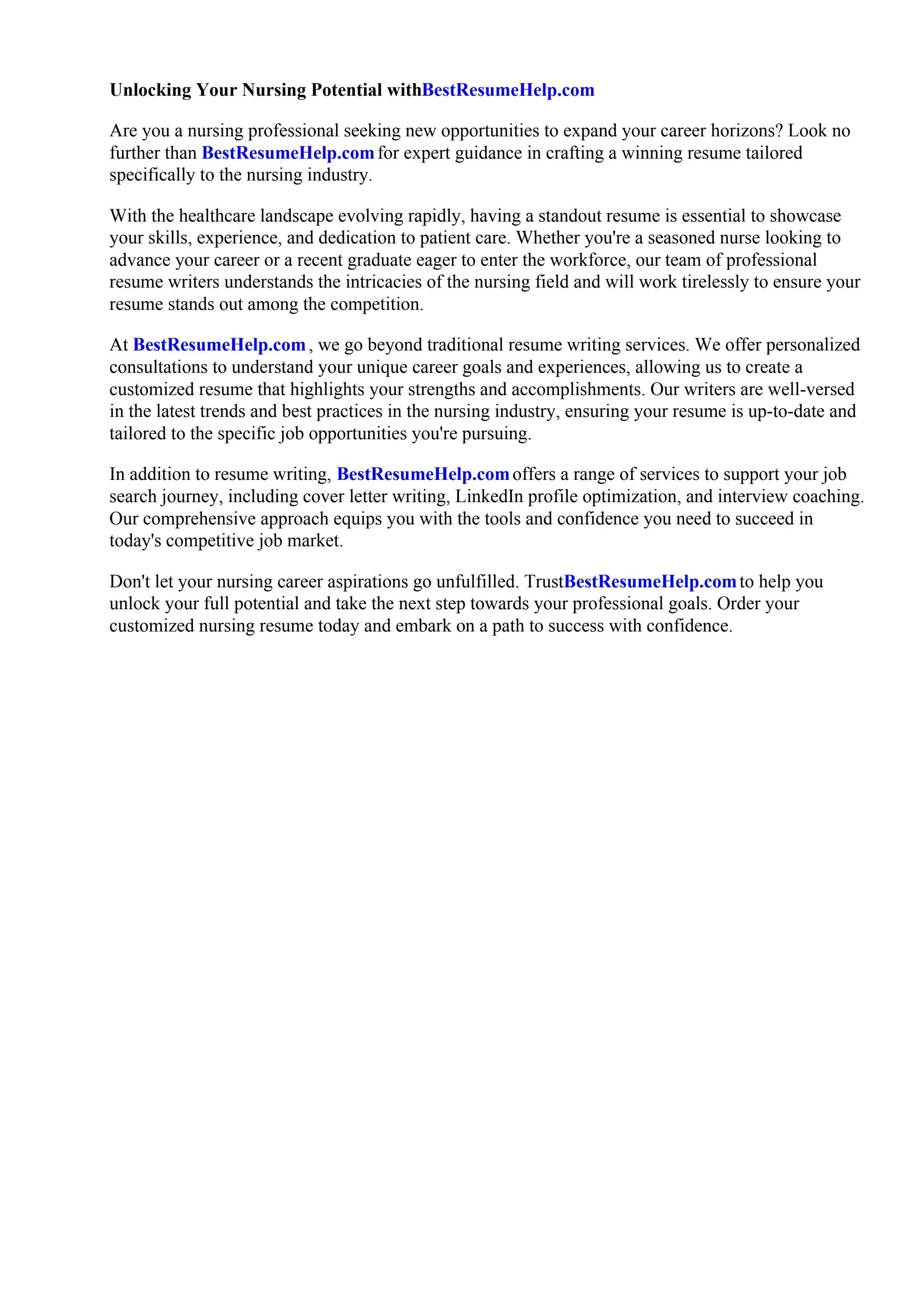
Demonstrate your passion for nursing and your enthusiasm for the specific internship opportunity. This can make a significant impact on the hiring manager. Explain what motivates you to pursue a career in nursing. Share your understanding of the organization’s mission. Show how the values of the organization align with yours. Researching the organization shows your initiative and genuine interest in the internship. This demonstrates that you’re not just looking for a job but a career where you can make a difference. Your passion and enthusiasm will make you a more compelling candidate.
Express Enthusiasm
Express your enthusiasm for the nursing profession and the specific internship you’re applying for. Explain why you are drawn to nursing and what aspects of the field excite you most. Mention specific areas of nursing you are interested in. Share what you hope to gain from the internship and how it aligns with your career goals. Demonstrate your eagerness to learn and contribute to the team. Avoid generic statements and provide specific examples of why you are passionate about nursing. Expressing enthusiasm showcases your commitment and makes you a memorable applicant.
Research the Organization
Research the healthcare organization you’re applying to. Learn about their mission, values, and the specific services they offer. Tailor your cover letter to reflect your understanding of the organization and how your goals align with theirs. Mention specific programs, departments, or initiatives that interest you. This shows that you have done your homework. Demonstrating that you are aware of the organization’s culture and mission shows your genuine interest and commitment. Make a connection between your interest and the organization’s values. This makes your application more compelling and shows the hiring manager that you are a good fit.
Closing Your Cover Letter Effectively
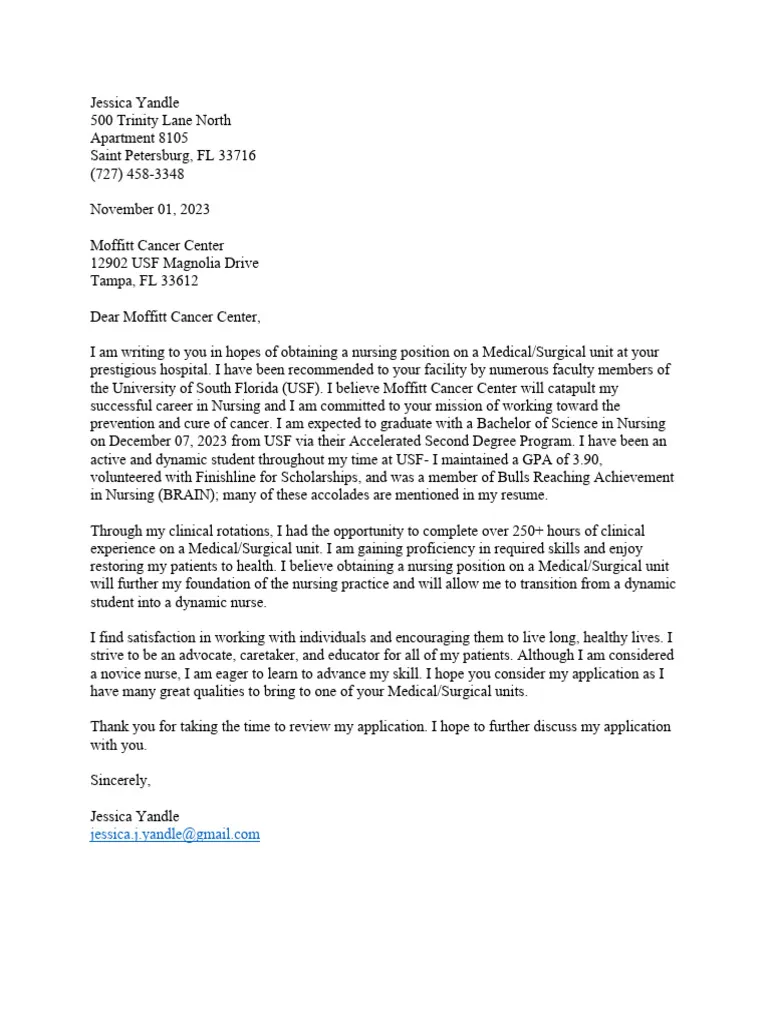
The closing paragraph is your final opportunity to leave a positive impression. Summarize your interest in the position and reiterate your key qualifications. Clearly state your enthusiasm for the opportunity and express your eagerness to contribute. Thank the reader for their time and consideration, and include a call to action. Your closing paragraph should be concise, professional, and leave the reader with a strong final impression of you. Your ending sentence has to be professional and convey enthusiasm.
Reiterate Interest
In your closing paragraph, reiterate your interest in the nursing internship. Summarize why you are a strong candidate and highlight your most relevant skills. Restate your enthusiasm for the opportunity to learn and contribute to the organization. Briefly mention why you believe you are a good fit for the role. Reminding the reader of your key qualifications and expressing your enthusiasm reinforces your interest. Reiterate your key qualifications, and summarize why you are the perfect candidate. This helps the reader remember your key strengths and your interest in the position.
Call to Action
Include a clear call to action, prompting the reader to take the next step. Express your availability for an interview and provide your contact information. Make it easy for the reader to respond. Include a polite request for them to contact you. State that you are available at their earliest convenience. Making it easy for the employer to contact you increases your chances of getting an interview. Include contact information again to allow them to contact you quickly. A clear call to action ensures the employer knows how to proceed and makes it easier for them to contact you.
Professional Closing
End your cover letter with a professional closing. Use a formal closing such as “Sincerely,” “Best regards,” or “Thank you.” Make sure it matches the tone of your letter. After the closing, leave space for your signature. If you’re submitting a digital application, you can type your name beneath the closing. Ensure your closing is appropriate and professional. This signifies your respect and professionalism. A polished closing reinforces the professional tone and leaves a lasting impression.
Proofreading and Editing
Proofreading and editing are critical to ensure your cover letter is polished and professional. Carefully review your cover letter for any errors in grammar, spelling, and punctuation. Errors can undermine your credibility. Check for typos and grammatical errors. Read your cover letter aloud to catch any awkward phrasing or sentence structure issues. Ask a friend, career counselor, or professor to review your letter for feedback. Ensure your cover letter is clear, concise, and free of errors. It demonstrates your attention to detail and professionalism. A perfectly proofread and edited cover letter makes a positive impression on employers.
